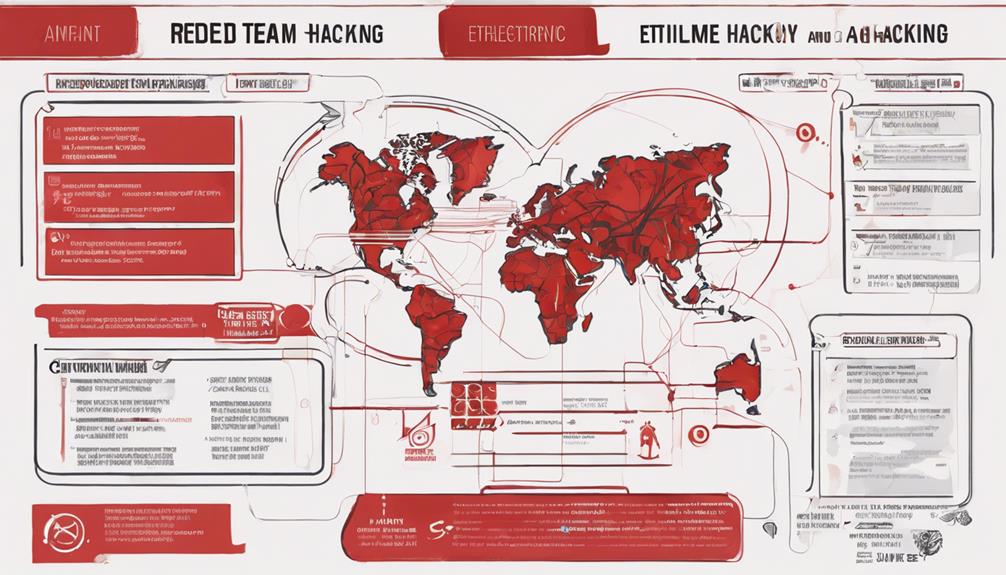In evaluating cybersecurity practices, both red teaming and ethical hacking offer unique strengths. Red teaming conducts sophisticated simulations to test an organization's response capabilities. Ethical hacking, on the other hand, focuses on proactively identifying vulnerabilities and improving defense mechanisms. Red teaming provides a thorough assessment of security posture, while ethical hacking aids in immediate vulnerability remediation. The choice between the two depends on the organization's objectives, with red teaming enhancing preparedness against real threats, and ethical hacking bolstering awareness and system defenses. Understanding their individual roles is crucial for robust cybersecurity strategies. Further insight into their nuances reveals their full potential.
Key Takeaways
- Red teaming evaluates security defenses and response capabilities comprehensively.
- Ethical hacking identifies and mitigates known vulnerabilities effectively.
- Red teaming uncovers unknown weaknesses through simulated attack scenarios.
- Ethical hacking enhances cybersecurity posture by addressing specific vulnerabilities.
- Red teaming offers a holistic evaluation, while ethical hacking focuses on targeted vulnerability assessments.
Red Teaming Overview
Red teaming, a strategic cybersecurity practice, involves conducting scenario-based adversary simulations to thoroughly assess an organization's security defenses. By simulating real-world attacks, red team testing goes beyond traditional security assessments, focusing on emulating stealthy attackers to provide a holistic view of an organization's security posture.
Unlike traditional security testing that may only identify network vulnerabilities, red teamers prioritize business outcomes, aiming to avoid detection and mimic the tactics of actual threat actors.
This approach is especially beneficial for organizations with mature information security postures seeking a thorough evaluation of their defenses. Red team testing serves as a top mitigating cost factor, potentially saving businesses significant amounts, as highlighted in IBM's Cost of a Data Breach 2020 report.
Ethical Hacking Fundamentals

Ethical hacking fundamentals encompass key principles that guide the practice of authorized hacking for security assessment purposes. Understanding legal considerations in hacking is vital for ethical hackers to operate within the bounds of the law while uncovering vulnerabilities.
Key Ethical Hacking Principles
Practitioners of hacking for security purposes adhere to fundamental principles aimed at identifying and addressing vulnerabilities within authorized parameters. Ethical hacking involves conducting controlled tests, also known as Red Team testing, to uncover weaknesses in security controls.
By simulating real-world cyber threats, ethical hackers assist organizations in strengthening their incident response capabilities and fortifying defenses against malicious actors. Responsible disclosure is a key aspect of ethical hacking, emphasizing the need to report identified vulnerabilities promptly while maintaining confidentiality to prevent exploitation before necessary patches are implemented.
Ethical hackers operate under a strict code of ethics, ensuring that their actions are legal, ethical, and beneficial to enhancing overall cybersecurity. Obtaining certifications like the Certified Ethical Hacker (CEH) credential demonstrates a commitment to upholding these principles and staying current with best practices in the field.
Ethical hacking serves as a proactive measure to safeguard systems and data from potential cyber threats, highlighting its critical role in modern cybersecurity strategies.
Legal Considerations in Hacking
Adhering to legal guidelines and obtaining informed consent are essential components of conducting ethical hacking activities within a structured framework. Ethical hacking involves maneuvering through a complex landscape of legal considerations to guarantee that security testing is conducted responsibly. This includes respecting data protection regulations and privacy laws to safeguard sensitive information during penetration testing and vulnerability assessments.
Additionally, ethical hackers must comply with responsible disclosure practices, balancing the timely reporting of identified security flaws with minimizing the risk of exploitation by threat actors. A robust code of ethics underpins ethical hacking, emphasizing integrity, professionalism, and respect for the law. By following a stringent ethical framework, ethical hackers can maintain trust with stakeholders and uphold the highest standards of cybersecurity practices.
Embracing legal considerations not only mitigates the risk of legal repercussions but also fosters a culture of transparency and accountability within the ethical hacking community.
Scope and Objectives

When comparing red teaming and ethical hacking, understanding the scope and objectives is essential. Red team engagements involve specific goals such as evaluating security effectiveness and mapping out potential attack vectors.
On the other hand, ethical hacking focuses on identifying vulnerabilities and appraising security measures in a more targeted manner. These distinct objectives shape the approaches and methodologies used in each practice, leading to different benefits and outcomes.
Red Team Benefits
A red team's benefits extend beyond traditional ethical hacking by encompassing a thorough scope that evaluates people, processes, and technology within an organization. Red team assessments go beyond merely identifying technical vulnerabilities; they aim to test detection and response capabilities, validate security effectiveness, and uncover potential attack paths.
By simulating real-world adversary tactics and procedures, red teams provide a realistic risk assessment that helps organizations understand their security posture thoroughly. The primary goal of red teaming is to reveal unknown weaknesses that may not be apparent through standard security assessments. These assessments not only point out vulnerabilities but also offer valuable recommendations to enhance an organization's cyber resilience.
Through their holistic approach and focus on real-world scenarios, red team assessments play an important role in strengthening an organization's security defenses and preparedness against evolving cyber threats.
Ethical Hacking Advantages
Ethical hacking, also known as white-hat hacking, focuses on proactively identifying system vulnerabilities and enhancing cybersecurity measures. Ethical hackers employ a variety of techniques to identify security weaknesses, conducting thorough assessments to improve overall security.
By continuously monitoring and testing systems, ethical hacking helps organizations stay one step ahead of cyber threats. This approach not only helps in mitigating potential risks but also strengthens risk management strategies.
Additionally, ethical hacking plays an important role in ensuring compliance with security standards and regulations. By identifying vulnerabilities and addressing them promptly, ethical hackers contribute to a proactive cybersecurity stance within organizations.
This proactive approach not only helps in preventing cyber-attacks but also aids in maintaining a robust security posture. Ultimately, ethical hacking serves as a valuable tool in enhancing security measures, meeting compliance requirements, and safeguarding against evolving cyber threats.
Effectiveness Comparison
In comparing the effectiveness of Red Team engagements to Ethical Hacking, the scope and objectives of each approach play a critical role in evaluating their impact on cybersecurity measures. Red team engagements, characterized by emulating real-world threat actor tactics, focus on testing detection and response capabilities while identifying attack paths that may go undetected in routine security measures.
On the other hand, ethical hacking, including penetration testing, aims to pinpoint vulnerabilities within systems, exploit them to demonstrate potential risks, and suggest remedial actions. Red teaming provides a holistic evaluation of an organization's security posture by stress-testing various aspects beyond network vulnerabilities, such as data, human, and physical assets.
In contrast, ethical hacking targets known vulnerabilities for immediate mitigation. The effectiveness of red teaming lies in its ability to paint a realistic risk landscape for organizations, offering insights into unknown weaknesses that might evade traditional security assessments.
Methodologies in Comparison

When comparing the methodologies of red team engagements and penetration testing, it is essential to understand their distinct approaches to evaluating and enhancing cybersecurity measures. Penetration testing primarily focuses on identifying vulnerabilities within systems and delivering reports on compromised systems. It validates security controls and offers recommendations for vulnerability mitigation.
On the other hand, red team engagements involve immersive assessments of people, processes, and technology to emulate real-world threat actor tactics. They assess security effectiveness, test detection and response capabilities, and validate prevention of cyber attacks.
While penetration testing is often a common compliance requirement for healthcare, finance, and data protection organizations, red team engagements stress-test security measures against real-world threats, aiming to uncover security flaws that might go undetected.
Cybersecurity professionals often use both methodologies to ensure a holistic approach to securing systems and networks, each providing unique insights into the overall security posture of an organization.
Strengths and Limitations

Red Teaming showcases a thorough and strategic approach to evaluating an organization's cybersecurity defenses by emulating actual cyber threats and testing the organization's detection and response capabilities. On the other hand, Penetration Testing, also known as ethical hacking, focuses on identifying vulnerabilities within systems and providing detailed reports on security weaknesses. To understand the strengths and limitations of each methodology, the table below summarizes key points:
| Aspect | Red Teaming | Penetration Testing |
|---|---|---|
| Focus | Emulating real-world attackers | Identifying system vulnerabilities |
| Ideal For | Organizations with mature security postures | Regular security assessments |
| Assessment Approach | Realistic evaluation of defenses | Staying ahead of cyber threats and compliance with standards |
| Limitation | Not the primary choice for routine security assessments | May not provide in-depth insights into detection capabilities |
Both methodologies play vital roles in enhancing cybersecurity, with Red Teaming offering a realistic assessment of defenses and Penetration Testing providing detailed insights into system vulnerabilities and security weaknesses.
Impact Analysis and Mitigation

When considering the impact analysis and mitigation strategies stemming from Red Team engagements versus ethical hacking, it becomes apparent that the two approaches offer distinct benefits.
Red Team tactics involve thorough attack simulations that provide a holistic view of an organization's security posture, leading to tailored recommendations for vulnerability remediation.
In contrast, ethical hacking strategies, while effective at identifying vulnerabilities, may not offer the same level of in-depth simulation to stress-test an organization's defenses thoroughly.
Red Team Tactics
Through the meticulous process of impact analysis and tailored mitigation recommendations, red team tactics play a pivotal role in enhancing organizational cybersecurity defenses. Red teamers thoroughly investigate the severity of exploited vulnerabilities, focusing on the potential business impacts and consequences of successful cyber attacks.
By simulating real-world attack scenarios, red team tactics provide invaluable insights that help organizations fortify their security posture effectively. The mitigation recommendations offered by red teamers are customized to target specific weaknesses unearthed during the evaluation, ensuring a strategic and proactive approach to cybersecurity.
Moreover, the impact analysis conducted by red teamers aids organizations in prioritizing remediation efforts based on the identified potential risks, enabling them to allocate resources efficiently and effectively.
Ethical Hacking Strategies
Conducting impact analysis and providing tailored mitigation recommendations are fundamental aspects of ethical hacking strategies aimed at strengthening cybersecurity defenses. Ethical hackers explore deeply into systems, uncover vulnerabilities, and simulate real-world attacks to gauge the potential impact of security breaches.
By offering detailed reports outlining the severity of exploited vulnerabilities, ethical hackers assist organizations in understanding the implications of successful attacks and guide remediation efforts effectively. Mitigation recommendations play an essential role in enabling organizations to prioritize security gaps and allocate resources for enhanced protection.
Through the implementation of these recommendations, organizations can bolster their security posture and resilience against cyber threats.
- Ethical hacking strategies aim to uncover vulnerabilities before malicious actors exploit them.
- Impact analysis helps organizations gauge the severity of security breaches and their potential consequences.
- Mitigation recommendations assist in prioritizing security gaps for remediation efforts.
- Ethical hackers provide valuable insights to guide organizations in enhancing their cybersecurity defenses.
- Effective mitigation strategies recommended by ethical hackers are pivotal in strengthening overall security resilience.
Vulnerability Remediation
An essential aspect of effective vulnerability remediation involves analyzing the broader business implications of identified vulnerabilities in red teaming scenarios. Impact analysis in red teaming goes beyond the technical impact of vulnerabilities to assess how they can affect the overall business operations and reputation.
By considering these business implications, organizations can prioritize their response to vulnerabilities based on potential risks and consequences.
In red teaming, strategic recommendations for mitigating vulnerabilities are often derived from real-world attack scenarios. This approach helps organizations proactively address weaknesses that could be exploited by malicious actors.
On the other hand, ethical hacking primarily focuses on providing detailed technical mitigation strategies to address identified vulnerabilities effectively within systems and networks.
Both red teaming and ethical hacking play crucial roles in guiding organizations towards thorough vulnerability remediation. While red teaming offers insights into strategic planning and response, ethical hacking provides detailed technical guidance for implementing necessary security measures.
Combining these approaches can result in a more holistic and robust vulnerability remediation strategy.
Effectiveness Metrics

Effectiveness metrics play a significant role in evaluating the success of both red teaming and ethical hacking initiatives within an organization. Red teaming metrics primarily focus on testing detection and response capabilities against realistic attack scenarios. On the other hand, ethical hacking effectiveness is measured by the identification of system vulnerabilities and the assessment of security controls in place.
Red teaming aims to provide organizations with a realistic risk picture by simulating stealthy attacks, enhancing preparedness.
Ethical hacking contributes to improving security awareness among employees, mitigating potential cyber threats proactively.
Red teaming is particularly recommended for organizations with mature security postures seeking real-world attack assessments.
Ethical hacking supports risk management strategies by pinpointing vulnerabilities that could pose significant risks.
Both red teaming and ethical hacking play crucial roles in fortifying an organization's overall cybersecurity posture by addressing different aspects of security testing and assessment.
Real-world Application

Application of Red Team Vs Ethical Hacking in Real-world Scenarios involves utilizing different approaches to enhance organizational security. Red teaming, a thorough security assessment method, simulates sophisticated cyber attacks to evaluate an organization's overall security posture. This process challenges the effectiveness of an organization's defenses by testing its ability to detect and respond to advanced threats realistically.
On the other hand, ethical hacking focuses on identifying vulnerabilities within specific systems or applications through controlled penetration testing. Ethical hacking provides detailed insights into individual weaknesses, aiding organizations in prioritizing security enhancements.
While red teaming assesses an organization's capability to detect, respond to, and mitigate complex cyber threats effectively, ethical hacking aids in improving the security of targeted systems. By combining the strengths of both red teaming and ethical hacking, organizations can establish a robust security framework that safeguards against a wide range of cyber threats in the real world.
Industry Adoption Trends

In response to the evolving threat landscape, industries are witnessing a notable shift towards embracing red teaming and ethical hacking practices to fortify their cybersecurity defenses. Red teaming is gaining popularity, especially in sectors like finance and healthcare, for its ability to provide thorough security assessments.
On the other hand, ethical hacking, often synonymous with penetration testing, is widely recognized across various industries for identifying vulnerabilities.
- Red team engagements are increasingly favored by organizations looking to stress-test their detection and response capabilities effectively.
- Penetration testing continues to be an essential component in compliance-driven sectors, ensuring continuous security assessments.
- The industry adoption trend towards red teaming signifies a move towards more advanced and realistic cyber threat simulations.
- Both red teaming and ethical hacking play crucial roles in enhancing cybersecurity measures and mitigating risks effectively.
As companies aim to stay ahead of cyber threats, the integration of red teaming and ethical hacking practices becomes increasingly important for safeguarding sensitive data and systems.
Future Outlook and Innovations

The forthcoming advancements in cybersecurity are poised to revolutionize the landscape of red teaming and ethical hacking practices. As the cyber threat landscape continues to evolve, red team operations and ethical hacking are adapting to stay ahead of malicious actors. One of the key trends shaping the future outlook of cybersecurity is the integration of AI and machine learning into red teaming processes. These technologies enable more thorough attack simulations, helping organizations identify vulnerabilities and enhance their defense mechanisms proactively.
To provide a clearer picture of the potential future developments, let's examine a table showcasing the anticipated innovations in red team operations and ethical hacking:
| Aspect | Future Outlook |
|---|---|
| Threat Intelligence | Increased integration for simulating advanced threats |
| AI & Machine Learning | Enhancing attack simulations for better preparedness |
| Tools & Solutions | Adoption of next-gen firewalls and EDR solutions |
| Expansion Areas | Cloud security testing and IoT device penetration |
| Security Methodologies | Convergence for more extensive security testing |
Frequently Asked Questions
What Is the Difference Between Red Team and Ethical Hacker?
Red Teamers simulate real-world cyberattacks to test detection and response capabilities, while ethical hackers identify vulnerabilities to strengthen security measures. Both play vital roles in enhancing cybersecurity, with red teamers focusing on emulation and ethical hackers on improvement.
How Much Does Red Team Pay Pentesters?
The compensation for pentesters in red teams varies, with entry-level to senior roles earning between $60,000 to over $120,000 annually. Lead red teamers can command salaries exceeding $150,000, reflecting the specialized skills and expertise demanded in this field.
What Is the Difference Between Red Team and Pentester?
Red teaming involves scenario-based adversary simulations to test detection and response capabilities beyond network vulnerabilities, while penetration testing focuses on identifying system vulnerabilities through manual or automated methods, suitable for compliance and baseline improvement purposes.
Which Is More Important the Red Team and Blue Team in Cybersecurity?
In cybersecurity, both the Red Team and Blue Team play crucial roles. The Red Team helps identify vulnerabilities through simulated attacks, while the Blue Team focuses on defense and compliance. Their collaboration guarantees a strong security posture.
Conclusion
To sum up, when evaluating the effectiveness of red teaming versus ethical hacking, it is important to remember the adage 'two heads are better than one.'
Both methodologies have their strengths and limitations, and their effectiveness ultimately depends on the specific objectives and scope of the task at hand.
By understanding the differences in methodologies and adopting a holistic approach to cybersecurity testing, organizations can better protect their assets from potential threats.









